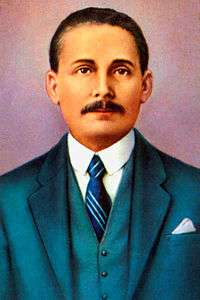José Gregorio Hernández
| Venerable José Gregorio Hernández, OFS | |
|---|---|
 | |
| Physician, Venerable | |
| Born |
October 26, 1864 Isnotú, Trujillo State, Venezuela |
| Died |
June 29, 1919 (aged 54) Caracas, Venezuela |
| Venerated in | Roman Catholic Church |
| Feast | June 29 |
| Patronage | Medical students, diagnosticians, doctors, medical patients |
Dr. José Gregorio Hernández, MD, OFS [er-NAHN-des] (October 26, 1864 - June 29, 1919) was a Venezuelan physician. Born in Isnotú, Trujillo State, Venezuela, he went on to reach legendary status, more so after his death.[1]
Life
In 1888 Hernández graduated as a medical doctor at Universidad Central de Venezuela, in Caracas. The Venezuelan government awarded him a grant to continue his studies in Europe. Hernández traveled to Paris, France, where he studied other fields of medicine such as: bacteriology, pathology, microbiology, histology, and physiology. Following his return to Venezuela, he became a leading doctor at the Hospital José María Vargas.
Between 1891 and 1916, Hernández dedicated himself to teaching, medicine, and religious practice. He sought priesthood in two occasions, but his fragile physical conditions would ultimately prevent him from achieving that status. He studied at the Monastery of Lucca in Italy for ten months in 1908. In 1913, he enrolled at the Latin American Pío School of Rome to continue the priestly career, but had to return to Venezuela for health reasons. Among the scientific publications of this famous Venezuelan are The Elements of Bacteriology (1906), About the Angina Pectoris of Malaric Origin (1909) and The Elements of Philosophy (1912).
Dr. Hernández treated the poor for free and even bought them medicines with his own money. One day in 1919, while bringing medicine to the home of one of his patients in Caracas, Hernández was struck by a car and killed.
Legacy
After his life, the legend of Dr. Hernández began to grow in Venezuela. People around the country started claiming to have been granted miracles after praying for his intercession to God.[1][2] At present, Dr. Hernandez is commonly invoked as "José Gregorio" by both doctors and patients for healing purposes.He is also called upon for protection during overland journeys. Eventually, his name became known all over Latin America and Spain.

In 1949, Venezuelan Catholic Church officials began the process of determining whether or not Dr. Hernández is eligible for sainthood as defined in the Roman Catholic Church. The Vatican granted him the title of Venerable in 1985. The next step in the process for Dr. Hernández is that of beatification;[3] Pope Francis accepted a visit to Venezuela by President Nicolás Maduro and intended to beatify Hernández.[4] His remains are housed in La Candelaria Catholic Church in Caracas, Venezuela.[5]
He is, also, revered by Venezuela's alternative and syncretic religion the Cult of Maria Lionza.[2][6] Historian Steven Palmer also has drawn parallels between the Hernández cult and that of the assassinated Costa Rican physician and politician Ricardo Moreno Cañas.[7]
A private university in Maracaibo, Universidad Dr. José Gregorio Hernández (launched in 2003), is named for him.[8] In 2008 he was honoured with the naming of a Bolivarian Mission, Misión Dr. José Gregorio Hernández, dedicated to the health of Venezuelans with disabilities.[9] In 2011, Hernández' birthday, October 26, was declared a "day of national celebration".[10] On August 26, 2014, the Catholic Bishops Conference of Venezuela called on all Catholics to attend Mass and thank God "for the life and example of this great Venezuelan, with great hope and implore the grace of his speedy beatification" on the occasion of the 150th anniversary of Hernandez' birth (Sunday, October 26, 2014).[11]
References
- 1 2 Fernández Juárez, Gerardo (2004). Salud e interculturalidad en América Latina: perspectivas antropológicas. Editorial Abya Yala. ISBN 9978-22-463-7 (Spanish)
- 1 2 Dinneen, Mark (2001). Culture and customs of Venezuela, Greenwood Publishing Group, pp. 32-34. ISBN 0-313-30639-7
- ↑ Neuman, William (1 October 2014). "Venezuelans Seek Sainthood For Beloved Folk Hero, José Gregorio Hernández". Huffington Post. Huffington Post Online. Retrieved 22 October 2014.
- ↑ http://www.redpres.com/t5680-el-papa-francisco-visitara-venezuela-el-proximo-ano-para-beatificacion-de-jose-gregorio-Hernandez
- ↑ "Places of Worship in Caracas". City Walk. GPSmyCity.com. Retrieved 22 October 2014.
- ↑ Cahana, Kitra. "The Cult of Maria Lionza". Reportage by Getty Images. Getty Images Inc. Retrieved 22 October 2014.
- ↑ Palmer, Steven Paul (2003). From popular medicine to medical populism: doctors, healers, and public power in Costa Rica, 1800-1940. Duke University Press, p. 217. ISBN 0-8223-3047-4
- ↑ (Spanish), Universidad Dr. José Gregorio Hernández, Historia, accessed 30 May 2012
- ↑ Venezuelanalysis.com, 17 March 2008, Venezuela Launches New Mission for Health of the Disabled
- ↑ (Spanish) El Nacional, 25 October 2011, Chávez decretó 26 de octubre Día de Júbilo Nacional por natalicio de José Gregorio Hernández
- ↑ Savino, Jorge Uros. "Message from the President of the CEV with the 150th birthday of the venerable Dr. Jose Gregorio Hernandez Cisneros". Bishops Conference of Venezuela. Servicios Educativos C.A. Retrieved 22 October 2014.